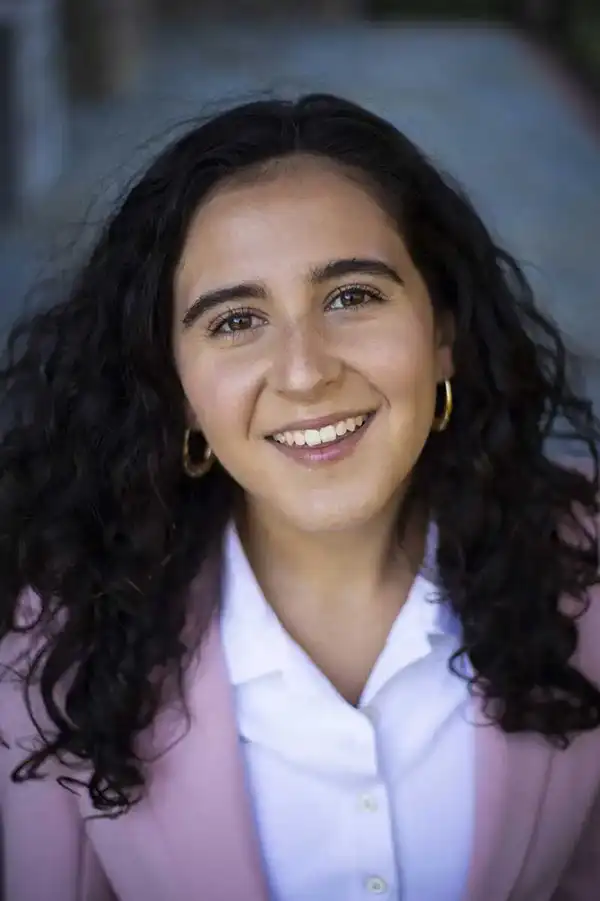Environmental videographer uses multimedia art to spread scientific awareness
Meet Chloe Malouf
For as long as Chloe Malouf can remember, science and art have gone hand in hand. When Malouf was given her very first computer it came packaged with free video editing software. She started making videos as often as she could ever since discovering how thrilling turning raw footage into a finished film could be. At the same time, she has a passion for the environment and is wary of the impact global warming will have on the planet. This inspired her to earn her triple bachelor’s in environmental studies, international relations and music from Tufts University.

Chloe Malouf is creating multimedia content to assist the Environmental Protection Agency (EPA) in its mission of protecting human health and the environment. (Photo Credit: Chloe Malouf)
She spoke about the importance of her chosen degrees.
“I did not choose a STEM career, but STEM chose me!” said Malouf. “I was determined to make an impact towards protecting people and the planet amongst the impending doom of climate change. I also studied music to help me cope with said impending doom.”
Even though she was not trained in video editing, Malouf worked with the Tufts University Admissions Office, making videos for their website and YouTube while also attending classes. While she enjoyed making videos, she recognized that she lacked the training that could turn her hobby into a hard skillset which she could be confident in. She started to look for opportunities to do just that.
After graduation, Malouf learned about the Oak Ridge Institute for Science and Education (ORISE) through a newsletter for environmental scientists. She joined as a fellow in the Office of Multimedia at the Environmental Protection Agency (EPA). The EPA Research Participation Programs provide college students, recent graduates, and university faculty opportunities to participate in current environmental research in areas such as air and radiation, water quality, solid waste and emergency response.
Malouf’s self-taught skills as a video editor and degree in environmental studies have come in handy across a multitude of sectors. She is making videos for trainings, press conferences, events and most importantly the public. This is quite an involved process. Malouf described in detail what a typical day as an EPA multimedia fellow is like. She is usually a part of the recording process – such as manning the teleprompter for talent to read – but her day is mostly spent on editing video, writing scripts and filming.
“Then I will take the video and edit it so that it is ready to be presented or posted on the internet,” explained Malouf. “After my mentor approves of the work, I coordinate with the client to make sure the video is all they imagined. Once they give me feedback, I make any desired changes and I upload the videos.”
One such video is “Gulf Guardian Award 2022: Community Resilience in the Classroom,” about a class on community resilience in the Gulf of Mexico, where sea levels may rise. Malouf and the Office of Multimedia team interviewed teachers and students to learn about the class and how it taught children to engage with their community about local climate change.
She also collaborates with the chief photographer to receive training in photography. This involves learning how to design lighting and how to edit the photos. She “never realized how important an understanding of photography is for a videographer until now,” says Malouf. The skills from taking photos have translated over to the filming part of the process, and she has placed extra focus on lighting design.
Lastly, Malouf assists in running virtual events. She may perform audio checks before the event, run slide shows for the presenters or film the event live.
Outside of art, Malouf is gaining valuable skills collaborating in a professional office space and is learning a lot about the environmental sector. She hopes that by the time her fellowship appointment ends that she will have more confidence in her ability to make high quality content, especially in videography. She thanks her mentor Jini Ryan for being a great support and says that her mentorship is one of the best parts of the experience.
“I would recommend the EPA program because it is an amazing opportunity to learn new skills and be trained in the field, while also contributing to the agency,” said Malouf.
After her appointment Malouf is unsure of her future plans but knows that she will continue using her art to positively impact the planet. She is considering placing her efforts on environmental action and will use her multimedia tools to communicate effectively with the public.
She offered some final advice to artists and STEM scientists alike: “It’s okay to not have it figured out and to just enjoy where you are at now. Know that it will all come together eventually. You will always have the skills you learned and the confidence to own your abilities.”
The EPA Research Participation Program is administered by the Oak Ridge Institute for Science and Education (ORISE). ORISE is managed for the U.S Department of Energy by Oak Ridge Associated Universities (ORAU).

